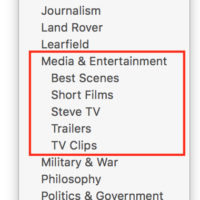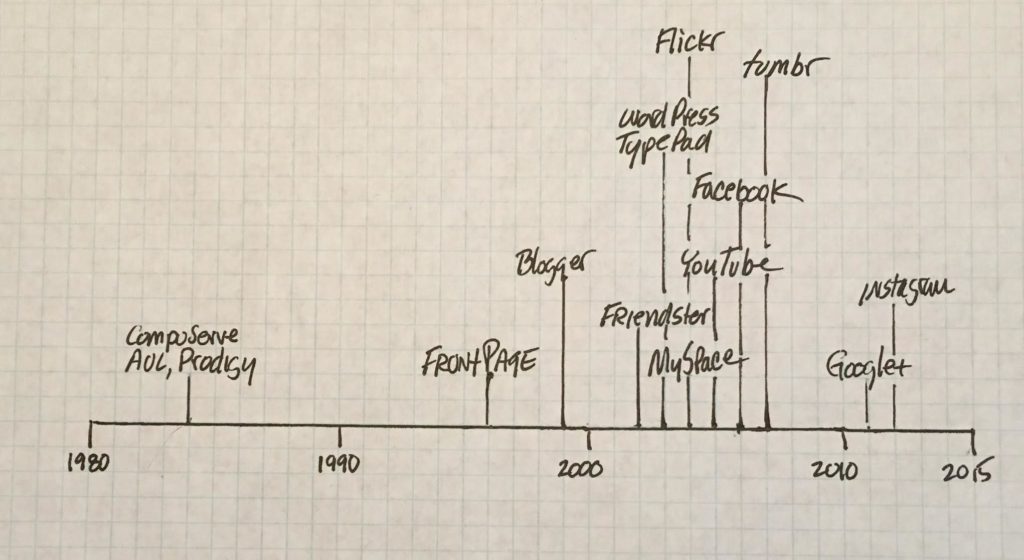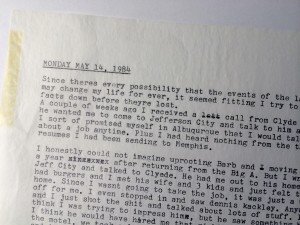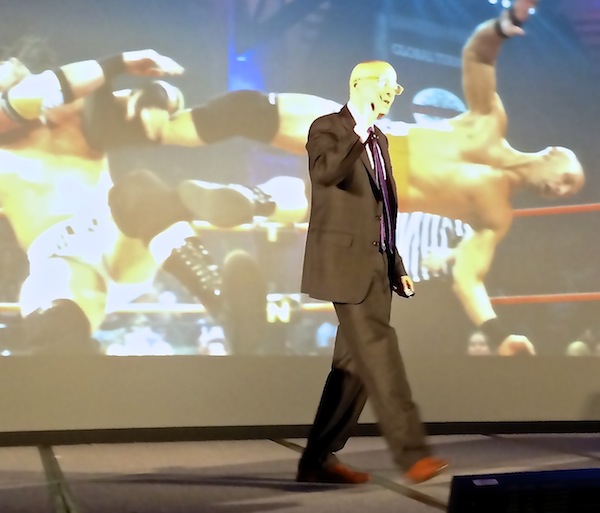 Tonight I created some sub-categories under the Media & Entertainment category here at smays.com. Still cleaning up and checking but the new categories are: Best Scenes; Short Films; Steve TV; Trailers and TV Clips. Click around on a few of these (pull-down in right sidebar) and you can see what I’ve tried to do.
Tonight I created some sub-categories under the Media & Entertainment category here at smays.com. Still cleaning up and checking but the new categories are: Best Scenes; Short Films; Steve TV; Trailers and TV Clips. Click around on a few of these (pull-down in right sidebar) and you can see what I’ve tried to do.
Tag Archives: blogging
Why Dave Winer won’t point to Facebook posts
He has two other reasons with which I agree, but this is my favorite:
“It’s supporting their downgrading and killing the web. Your post sucks because it doesn’t contain links, styling, and you can’t enclose a podcast if you want. The more people post there, the more the web dies. I’m sorry no matter how good your idea is, fuck you I won’t help you and Facebook kill the open web.”
I’ll have a blog till the day I die or I’m too far gone to maintain it. God willing, I’ll have an AI to take over at that point.
WordPress Media Library
The screencast below is about one of the under-the-hood features of WordPress. So it’s going to be of zero interest to anyone who doesn’t have (or has had) a blog or website using WordPress as the content management system.
WP is great for searching. I have 5,000 posts going back 15 years but if I can remember a word or phrase, WP will find all references in a matter of seconds. If you include media (photo, video, audio) with your post, WP puts it in the Media Library. I had more than 1,600 pieces of media in my library but I couldn’t search because I hadn’t taken the time to give the media a useful name or any other metadata. This 6 minute screencast shows how I cleaned that up and why.
As I’ve experimented with various online tools for managing media (iCloud, Google Photos, Flickr), I’ve found myself drawn back to my WordPress blog. Let me hasten to point out almost nobody visits my blog. That’s been true since the beginning. It’s always been more journal/archive.
But when I put images online, I try do so in some context. If I have 50 photos of my mother as a young woman, I’d rather include those (as a slideshow or gallery) as part of blog post that might include links to other posts and images. You get the idea.
For me, the stories behind the images (if I know them) are as important as the images themselves. A blog works well for this. And because it is self-hosted, I don’t have to worry that Yahoo! or Google or Facebook might one day kill it.
Dave Winer’s Comment Guidelines
I forgot how often Dave Winer says things I think but can’t find the words for. Below are a few excerpts from his comment guidelines on Scripting News.
They should always take into account what is said in the post. If you haven’t read the post in full, reasonably carefully, don’t comment. If it is obvious that you have not read the post, your comment will be deleted.
It’s not a free speech zone. It’s not a place for you to be heard.
It’s not a place for you to promote your products, services, blog, initiatives, political causes. Don’t post spam.
I’m not interested in debates here on my blog. If you want a debate, host it somewhere else, and if I’m interested in participating I will.
Absolutely no personal comments about me or anyone else.
A blog is like a flower bed
A website — especially a blog — is like flower bed. Stop weeding for even a few days and you have ass high weeds everywhere. For the last couple of weeks I’ve been pulling weeds here. Since starting this blog in 2002 I’ve posted about 5,700 items. These fall into four basic type:
- Original
- Excerpts from articles
- Book quotes/excerpts
- Media: video, audio, images
So far I’ve deleted about 600 posts. Some got yanked because the off-site story to which they linked was gone; in some cases the embedded media (video, audio, images) stopped working; and some of the stuff I posted was just worthless (flushing sound). Of the remaining 5,000+ posts almost 700 include video and 90 have an embedded audio clip.
The most time consuming chore has been cleaning up meta data: categories and tags. I’m a bit anal on this topic and I’ll explain why.
The reason I started — and continue — blogging is so I’ll have a place I can put stuff and find it later. WordPress (the content management system this blog runs on) is great at search but with 5,000 items that doesn’t help if you don’t know what to search for. Putting each new post in one or more categories and assigning appropriate tags makes this easier.
For example, I have a category for Social Media and tags for posts about Twitter, Facebook, YouTube, etc. Apple is a category… iPad, iPhone, iPod and MacBook are tags. You get the idea. If it sounds like a lot of tedious work, it is.
In some respects I’m like the guy that builds the scale model of the Taj Mahal out of Popsicle sticks in his basement. Nobody’s gonna see it but that’s not the point.
30 years online
I started blogging in 2002 and still post a few times a week. It’s more of a journal than a public blog because a) I don’t get a lot of visitors and b) I don’t much care. With 5,000+ posts, “link rot” is always an issue but WordPress has gotten so good it’s pretty easy to manage things. Sifting back and forth through 14 years of posts, one becomes aware of how much has changed, in terms of the tools and services we have for online sharing.

I got my first computer around 1985, about the time local BBS’s (bulletin board systems) started popping up. Wasn’t long before CompuServe, AOL and Prodigy came along and I delighted in the topic forums.
I started blogging before there was a good tool. I used Microsoft FrontPage to create a website where I could post stuff but a few years later (1999) Blogger came along and I was in heaven. I stayed with that for a few years before jumping over to TypePad (a tortuous process) and then, finally, to WordPress.
Social media took off in the early-to-mid ’00s. Friendster, MySpace, Flickr, YouTube, Facebook, tumblr. These days it feels odd (to me) to use the term “social media” because it’s all social. Is there a newspaper, radio station, TV station, magazine that does NOT have an “online presence” (another quaint expression)?
It feels like all of this has happened almost overnight but my little graph tells me it’s been 30 years. How connected will we be in another 30?
Journals
 I’ve been blogging since February, 2002, and for most of that time I equated the effort with keeping a diary or journal. I was wrong. I came to this conclusion after reading back through some of my journals from the early eighties. (Index below)
I’ve been blogging since February, 2002, and for most of that time I equated the effort with keeping a diary or journal. I was wrong. I came to this conclusion after reading back through some of my journals from the early eighties. (Index below)
I was struck by the personal, private tone of these entries. I would not have wanted to share these thoughts with others, even if there had been a way (Internet, blogs, etc). I usually wrote longhand in a spiral bound notebook. Once in a while I’d type an entry on my manual typewriter.
Reading my thoughts from thirty years ago feels almost… intrusive. That was a very different person. He was anxious and prone to worry. He drank too much ( or thought it did. He worried about it). He lacked self confidence. I feel my shoulders tense as I read these entries. I suspect writing this stuff down was a way of coping. I wish I could time travel back and leave a “note from your future self” telling him to relax. It turns out great in the end.
The image above is from an entry on May 14, 1984. Just a couple of weeks after I accepted the job I just retired from (after 29 years). I’m putting all of this stuff in my Google Drive and sharing it with family.
After a dozen years of blogging publicly, I don’t expect to return to the the diary format, but David Cain has some interesting thoughts on the value of putting one’s personal thoughts down on paper:
“The simple act of writing out a thought keeps it still long enough for you to get a good look at it. Once it’s there in front of you, you can decide if it’s true, and whether you ought to do anything about it.”
Journal entries from 1983-1985
New blog theme
Posting here feels like the mother who keeps her son’s room just as it was when he went away to college. It feels good just to come in and sit on the bed for a few minutes. I (briefly) considered abandoning this blog when I got caught up in Google+. Which is where I spend most of my online time these days. But — like a high school yearbook — it’s fun to flip through the pages here once in a while.
In the eleven years since I started posting things here, I’ve changed themes numerous times. Getting progressively minimalist over time. The current theme/framework is Genesis (by STUDIOPRESS). Gonna be hard to get more bare bones.
Seth Godin on Blogging, Radio and Stuff

The company I worked for for 29 years, Learfield, brought four or five hundred employees and friends to Dallas last week to celebrate the company’s 40th anniversary. We had two speakers: Ken Blanchard and Seth Godin. Following Mr. Godin’s excellent talk, he took questions.
How important is your blog?
“There’s two kinds of important. There’s the important of ‘can I make a living doing this,’ and the important of ‘this is who I am.’ My blog has nothing to do with me making a living. I don’t run any ads on it and I don’t sell many things on it, almost nothing, and that’s not why I do it and why I’ve been doing it for ten years. I do it because this is my chance to speak the thing I want to say, to talk about what I notice. If I had to pay money to write my blog, I would. The people who have blogs you don’t want to read are doing that blog because it’s their job. So I spend more time on my blog than almost anything I do because it’s my chance to do my art, as I see my art. […] The people who say ‘how am I going to get paid for this tomorrow?’ never make good stuff.”
“My blog is read by more people than all but ten magazines in the United States. And I write the whole thing by myself, every day. I don’t expect to stop blogging any time in the next 40 years.”
What do you see as the future of radio?
“Radio means two things. Radio means audio delivered to masses of people who want to hear it, and it means FCC coveted spectrum. Spectrum is over. For sure. We’re only two years away from cars having radio in them that has wifi. Once that happens, my radio, in my car isn’t going to have ten channels or a hundred channels, it’s going to have ten thousand channels, a hundred thousand channels. When there’s a hundred thousand radio stations to choose from, I’m not going to pick the local jock who’s yelling at me because he needsw his Arbitron ratings to go up a tenth of a point, I’m going to pick someone who cares. Radio connects us if it chooses to.”
And here are some of my notes from Mr. Godin’s remarks: Continue reading
If you’re serious about ideas, blog
“Blogging’s ability to impact mainstream discourse has never been greater. When I worked as a reporter a decade ago, I knew that when my editor decided to put something on the web — but not in the actual paper — it was a brushoff. Fewer people would see the web content, and (pre-Google) it would evaporate into the ether; it wasn’t solid like an actual paper on someone’s doorstep. Now the hierarchy has been reversed; an article lives forever on the web and will be seen around the world. Nick Bilton’s blog on the New York Times website has just as much credibility as what’s in the print edition; and Mashable, in the tech world, has as much or more credibility than the Times. Nowadays, we’re measured by the quality of information — not its brand name. If you create high-quality content, you legitimately may become a source as powerful and trusted as the “legacy media.”
